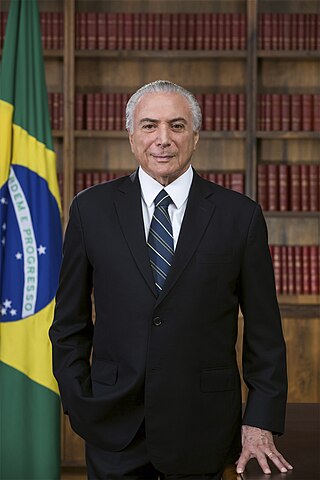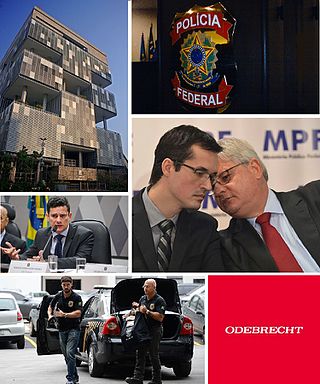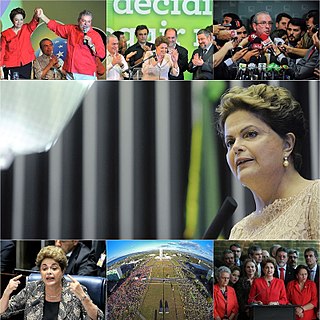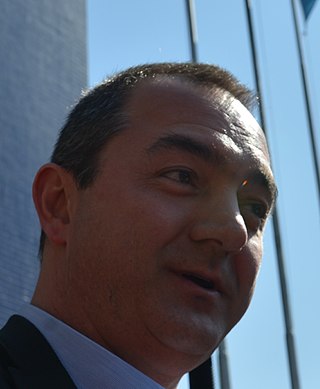
Aécio Neves da Cunha is a Brazilian economist, politician and former president of the Brazilian Social Democracy Party (PSDB). He was the 17th Governor of Minas Gerais from 1 January 2003 to 31 March 2010, and is currently a member of the Brazilian Chamber of Deputies. He lost in the runoff presidential election against Dilma Rousseff in 2014.

JBS S.A. is a Brazilian company that is the largest meat processing enterprise in the world, producing factory processed beef, chicken, salmon, pork, and also selling by-products from the processing of these meats. It is headquartered in São Paulo. It was founded in 1953 in Anápolis, Goiás.

Michel Miguel Elias Temer Lulia is a Brazilian politician, lawyer and writer who served as the 37th president of Brazil from 31 August 2016 to 31 December 2018. He took office after the impeachment and removal from office of his predecessor Dilma Rousseff. He had been the 24th vice president of Brazil since 2011 and acting president since 12 May 2016, when Rousseff's powers and duties were suspended pending an impeachment trial.

Corruption in Brazil exists on all levels of society from the top echelons of political power to the smallest municipalities. Operation Car Wash showed central government members using the prerogatives of their public office for rent-seeking activities, ranging from political support to siphoning funds from state-owned corporation for personal gain. Mensalão for example was the practice of transferring taxpayer funds as monthly allowances to members of congress from other political parties in consideration for their support and votes in congress. Politicians used the state-owned and state-run oil company Petrobras to raise hundreds of millions of reais for political campaigns and personal enrichment.

Operation Car Wash, or Operation Jet Wash was a landmark anti-corruption probe in Brazil. Beginning in March 2014 as the investigation of a small car wash in Brasília over money laundering, the proceedings uncovered a massive corruption scheme in the Brazilian federal government, particularly in state-owned enterprises. The probe was conducted through a joint task force of agents in the federal police, revenue collection agency, internal audit office and antitrust regulator. Evidence was collected and presented to the court system by a team of federal prosecutors led by Deltan Dallagnol, while the judge in charge of the operation was Sergio Moro. Eventually, other federal prosecutors and judges would go on to oversee related cases under their jurisdictions in various Brazilian states. The operation implicated leading businessmen, federal congressmen, senators, state governors, federal government ministers, and former presidents Collor, Temer and Lula. Companies and individuals accused of involvement have agreed to pay 25 billion reais in fines and restitution of embezzled public funds.

The impeachment of Dilma Rousseff, the 36th president of Brazil, began on 2 December 2015 with a petition for her impeachment being accepted by Eduardo Cunha, then president of the Chamber of Deputies, and continued into late 2016. Dilma Rousseff, then more than 12 months into her second four-year term, was charged with criminal administrative misconduct and disregard for the federal budget in violation of article 85, items V and VI, of the Constitution of Brazil and the Fiscal Responsibility Law, Article 36. The petition also accused Rousseff of criminal responsibility for failing to act on the scandal at the Brazilian national petroleum company, Petrobras, on account of allegations uncovered by the Operation Car Wash investigation, and for failing to distance herself from the suspects in that investigation.

From mid-2014 onward, Brazil experienced a severe economic crisis. The country's Gross Domestic Product (GDP) fell by 3.5% in 2015 and 3.3% in 2016, after which a small economic recovery began. That recovery continued until 2020, when the COVID-19 pandemic began to impact the economy again.

Events in the year 2017 in Brazil.

Alexandre de Moraes is a Brazilian jurist, currently serving as president of the Superior Electoral Court and as a justice of the Supreme Federal Court.

Joesley Mendonça Batista is a Brazilian businessman, son of José Batista Sobrinho. He is responsible for the expansion and internationalization process of JBS S.A., the largest meat-packing company in the world, and one of the main agribusiness companies in Brazil, and J&F Investimentos which he shares with his wife, Flora, and five children. As of October 2021, his net worth was estimated at US$4.1 billion.

JBS Foods International (JBSFI) engages in the food business internationally, and is the largest meatpacking company in the world. It is a "controlled company" in SEC parlance. JBSFI operates through four segments: Beef, Pork, Poultry, and Other. It offers fresh and processed beef, lamb, sheep, pork, and chicken. JBSFI is the largest leather processor in the world. It also processes collagen, biodiesel fuel, hygiene and cleaning products, and is involved in metal packaging, carriers, waste management, casings, and trading activities, as well as provides prepared food products.
Wesley Mendonça Batista is a Brazilian billionaire businessman, and founder of JBS S.A. Batista was the president of the JBS group and was responsible for the implementation of JBS operations in the US since the acquisition of Swift in 2007.

A long series of criminal investigations have occurred in Brazil associated with Operation Car Wash, since the first one began in March 2014. These investigations are considered offshoots of the original phased investigations.

The JBS Testimonies in Operation Car Wash refer to the leniency agreement signed between the company JBS and the Office of the Attorney General of Brazil (PGR) in April 2017, within the scope of Operation Car Wash. The Brazilian Supreme Federal Court (STF) approved the agreement on May 18, 2017, based on the plea bargain of the owners Joesley and Wesley Batista and executives of the company. On September 14, 2017, former Attorney General Rodrigo Janot rescinded the agreement with Joesley and Ricardo Saud due to suspicions of obstruction of investigation by the collaborators. The following year, Attorney General Raquel Dodge rescinded the agreement with Wesley Batista and Francisco de Assis e Silva due to their omission of criminal facts of which they were aware.
The JBS Parliamentary Inquiry Commission, better known as JBS CPI or JBS CPMI, is a Parliamentary Inquiry Commission created on September 5, 2017, with the purpose of investigating alleged irregularities committed by the J&F group, which controls the JBS meatpacking company, in relation to loans from the Brazilian Development Bank (BNDES) between the years 2007 and 2016, as well as the plea bargain agreement made by the group with the Federal Public Prosecutor's Office.

The accusations against Michel Temer by the Office of the Attorney General of Brazil consisted of two accusations for common crimes filed by the Attorney General of Brazil, Rodrigo Janot, against the President of the Republic, Michel Temer, based on the crimes of passive corruption, criminal organization, and obstruction of justice, within the scope of Operation Car Wash.
The removal of Aécio Neves from the Federal Senate of Brazil stems from a provisional decision granted by Supreme Court (STF) Minister Edson Fachin on Thursday, May 18, 2017, determining the removal of Aécio Neves (PSDB-MG) from his position as senator. The accusation is that he allegedly asked for two million reais from the owners of the JBS meatpacking company. On May 31, 2017, through electronic drawing, Minister Marco Aurélio Mello was chosen as the new rapporteur of the process.

The presidency of Michel Temer began on May 12, 2016, when the vice-president of the Republic, Michel Temer, temporarily assumed the position of president of the Brazilian Republic, after the temporary removal of President Dilma Rousseff, as a result of the acceptance of the impeachment process by the Federal Senate. Once the process was concluded, on August 31 of the same year, Temer took over the position permanently, which he held until January 1, 2019, when the administration of Bolsonaro began.













